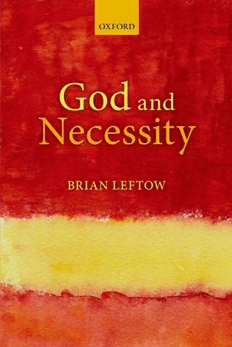
God and Necessity PDF
Preview God and Necessity
God and Necessity This page intentionally left blank God and Necessity BRIAN LEFTOW 1 3 GreatClarendonStreet,Oxford,OX26DP, UnitedKingdom OxfordUniversityPressisadepartmentoftheUniversityofOxford. ItfurtherstheUniversity’sobjectiveofexcellenceinresearch,scholarship, andeducationbypublishingworldwide.Oxfordisaregisteredtrademarkof OxfordUniversityPressintheUKandincertainothercountries #BrianLeftow2012 Themoralrightsoftheauthorhavebeenasserted FirstEditionpublishedin2012 Impression:1 Allrightsreserved.Nopartofthispublicationmaybereproduced,storedin aretrievalsystem,ortransmitted,inanyformorbyanymeans,withoutthe priorpermissioninwritingofOxfordUniversityPress,orasexpresslypermitted bylaw,bylicenceorundertermsagreedwiththeappropriatereprographics rightsorganization.Enquiriesconcerningreproductionoutsidethescopeofthe aboveshouldbesenttotheRightsDepartment,OxfordUniversityPress,atthe addressabove Youmustnotcirculatethisworkinanyotherform andyoumustimposethissameconditiononanyacquirer BritishLibraryCataloguinginPublicationData Dataavailable LibraryofCongressCataloginginPublicationData Dataavailable ISBN978–0–19–926335–6 PrintedinGreatBritainby MPGBooksGroup,BodminandKing’sLynn LinkstothirdpartywebsitesareprovidedbyOxfordingoodfaithand forinformationonly.Oxforddisclaimsanyresponsibilityforthematerials containedinanythirdpartywebsitereferencedinthiswork. For Dick Trammell, who got me started, and for my parents This page intentionally left blank PREFACE This book provides a metaphysic of modality in which God plays the chief part; to locate my position, start at Aquinas and take a half-step toward Descartes. I am writing for theist analytic philosophers, atheist analytic philosophers, and (optimistically) some theologians. Theist analytic philoso- phersmayseeatoncewhymyprojectisworththeirtime.Ifyoufallintothis campbutdonotseeit,theIntroductionandChapters2–4willtrytoconvince you.Ioffer threethingstohook atheists’attention:achancetobashtheism, (partof)anewsortofargumentforGod’sexistence,andwhatIhopeissome decentmetaphysicsthatisdetachablefromthetheisticcontext.Thechanceto bash arises from the Introduction and first four chapters, which argue that theism brings with it commitment to a particular sort of metaphysics of modality. Here, then, is your chance: theists should believe that, and that, youmaywanttoargue,isabsurd.Buttoseewhetheritreallyis,youwillhave to go on and consider the theory I offer. The argument for God’s existence arisesoutofthetheory,andsoifyouwanttoconsiderthat,again,therestof thebookwillhaveapointforyou.Thedetachablemetaphysicscropsuphere and there throughout, but particularly in Chapters 13 and 16. As to theolo- gians—well,foralotofthemthisbookwillbeasteephilltoclimb.ButIhope I have things to say about the doctrine of Creation in the Introduction and Chapters 1–4 that may repay their attention. In Chapter 7 there are what amount to a priori arguments for monotheism that may also be of interest. Doctrinesofdivineideashavealonghistoryintheology,andChapters10–12 offer ananti-Platonistonethat may striketheirfancies. Andagain, theymay want to make the effort to get through the book to see if the sort of commitmentI make about Creation reallycan be sustained. Every project starts somewhere. I present a realist account of modality; while I have some things to say against some forms of anti-realism, full discussion of such views must wait. For reasons of length I have also sup- pressed much I would have liked to say about logic, mathematics, and the history of my topic. Now a word about pronouns. Many philosophers have takenupusing‘she’asthegenericthird-personpronoun.Ihavenot,asIhave never heard a reason given for this, and it is not the English I learned at my mother’sknee.Someoscillateinthecourseofapiecebetween‘he’and‘she’. I have found this distracting as a reader: change of gender suggests that someone else is in view than was being discussed before. ‘He or she’ will do, but becomes tiresome when used too often. Mostly I try to avoid the issue, but I sometimes try second-person constructions: I am addressing my reader anyway, so why not just do so explicitly, with a friendly ‘you’? Some viii Preface contexts,however,requireadifferenttreatment.SometimesIspeakwithwide third-persongeneralityofaclasstowhichIbelong,whenwhatIreallyhavein mindismyself,ormyselfasaprimaryexampleoftheclass.Onsuchoccasions Iamatleastinthefirstinstancetalkingaboutmyself.Iamnotindoubtasto whether I am he or she, and simply to use ‘she’ would be literary cross- dressing; I hope readers who avoid the word will excuse my ‘he’. I use traditional male language to refer to God: if it was good enough for Jesus, it is good enough for me. I also presume that the human authors of Old Testament books were male. Given the times and culture, the chance that they were not is vanishingly small. Onenicethingaboutprefacesisthechancetosay‘thanks’.Ihavededicated this volume to my first philosophy teacher, a man into whose classroom I wandered as a college sophomore—a skinnyguy in a rumpled jacket with chalk-dust all over and an infectious grin just to the north. We come to see what our parents did for us when we become parents ourselves: with a 4-4 regular teaching load, he took the time for a senior independent study in which we hacked over Principia Mathematica together, and I now know how extraordinary that was. I still remember some of his jokes, and the logic he taught me; I also remember that first moment when it struck me that it would be great to love what I did for a living as much as he obviously did. Thanks, Dick, for my career. To my parents, of course, thanks of a wholly different sort. At various points my thinking has been supported by faculty fellowships at Fordham University, the Center for Philosophy of Religion at the University of Notre Dame, and the Evangelical Scholarship Initiative of thePewFoundation:toall,mysincerestthanks.Ihavereadpapersonsomeof this to the American Philosophical Association, the Society of Christian Philosophers,theBritishSocietyforPhilosophyofReligion,andphilosophical meetingsatOxford,Cambridge,theUniversityofBirmingham,theUniversity of Texas at San Antonio, Trinity College Dublin, University College Dublin, andQueen’sUniversityBelfast.IalsohadthepleasureofaveryactiveOxford seminar on the mind of God. The late Phil Quinn, with characteristic generosity, commented on the whole of an earlier version of the MS, and Evan Fales and Bill Alston read substantial chunks of it. I have also learned from reading groups at the Notre Dame Center, and from Jan Cover, Tom Flint, Hugh McCann, Chris Menzel, Nicholas Nathan, Tim O’Connor, Al Plantinga,MikeRea,GonzaloRodriguez-Pereyra,LindaZagzebski,andDean Zimmerman. I also thank the referees for Oxford University Press and some journals. Conversations on this topic have spanned mycareer, so I am quite sureIhaveforgottentothank someone;pleasepardonmeif itisyou.Joseph Jedwab compiled most of the bibliography. Finally, thanks of another sort: partoftheIntroductionappearedin‘WhyPerfectBeingTheology?’,Interna- tionalJournalforPhilosophyofReligion69(2011),103–18,andpartsofChapters 5 and 6 in ‘Against Deity Theories’, Oxford Studies in Philosophy of Religion Preface ix 2 (2009), 105–60. My thanks to the editors for the reuse of this material, and also my apologies to readers of the latter: a glitch not caught in the proofs madegibberishofpartof itsargument.YouwillseeherewhatImeanttosay there. My thanks to the Editor and Cambridge University Press for permis- sion to use some of “Swinburne on should be Divine Necessity” (Religious Studies 46 (2010), pp. 141–2), which appears in chapter 1. This chapter also drewmaterialfrom“Necessity.”inCharlesTaliaferroandChadMeister,eds, The Cambridge Companion to Christian Philosophical Theology (Cambridge Uni- versityPress,2010),pp.15–30,reproducedwithpermission.Someofchapter 6appearedin“AquinasonGodandModalTruth.”ModernSchoolman82(2005), pp.171–200,andisre-usedbypermission.Someofchapter23appearedin“One StopTowardGod,”RoyalInstituteofPhilosophySupplement68(2011),pp.67–104, andisusedbypermission. Brian Leftow Oriel College September 2011
